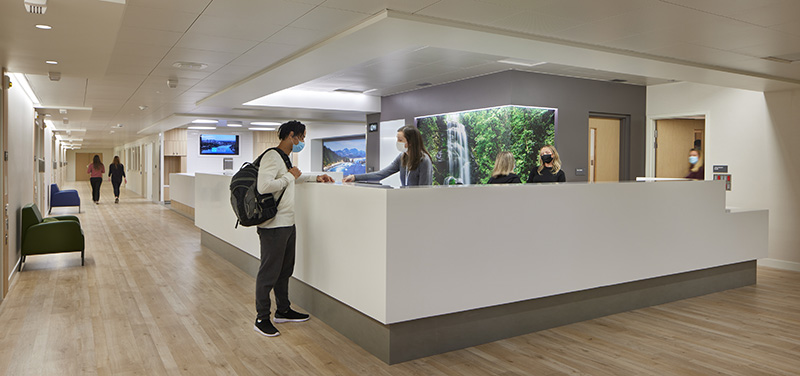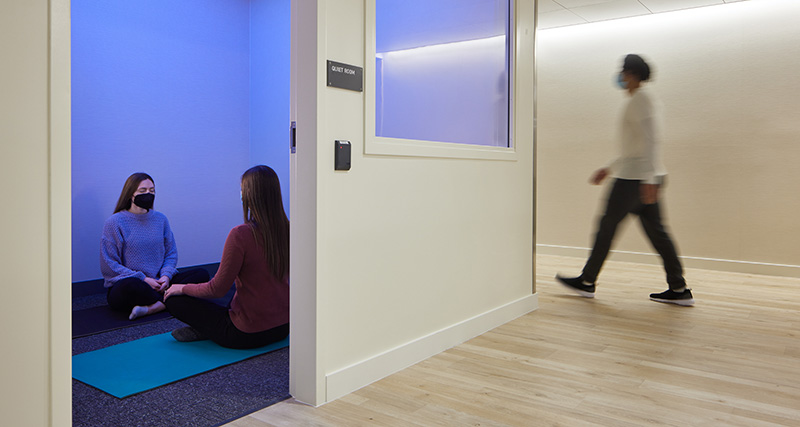Behavioral Health Unit – Inpatient
The Overlake Behavioral Health Unit is a voluntary short-stay inpatient unit and the only one of its kind on the Eastside. We offer expert care in a welcoming environment, tailored to each patient’s individual needs.
Overlake Medical Center & Clinics has offered leading psychiatric care in the Puget Sound Region since 1968. As part of our commitment to prioritizing high quality behavioral healthcare services, we recently updated our inpatient behavioral health unit. Now called the Norcliffe Foundation Behavioral Health Unit, this state-of-the-art space is run by a highly experienced team who serves the needs of people facing behavioral health challenges.

A program and space built for people with behavioral health needs
The Overlake Behavioral Health Unit offers two programs. The first is an inpatient group-therapy focused mental health stabilization program designed to get a patient out of crisis, so that they are safe and not a harm to themselves or others. The second is a dual-diagnosis program that helps stabilize acute mental health needs and addresses substance use disorders.
Our compassionate mental health professionals help patients address their immediate mental health needs in a welcoming and safe environment focused on healing. Our space was designed to feel like a meditation garden rather than a medical facility and includes:
- 14 inpatient rooms with private bathrooms and showers.
- Private rooms where patients can receive care and interact with providers.
- Group therapy rooms.
- Space for group activities.
- Visiting hours two times per day with access to hospital phones and a shared computer.
- Hospital toiletries and Inpatient Dining Services.
- Access to a well-stocked activity room offering books, magazines, puzzles, art supplies, movies, and iPads for use between therapy sessions.
When patients complete our program, we connect them with experts in the community to continue their healing. Our services are covered by most major insurance plans, including Medicaid and Medicare. We also offer charity care to eligible patients and/or payment plans for treatment.

What we treat
Our care team works with patients and their doctors to determine if this is the right program for them. When each patient arrives, we complete a full psychiatric evaluation and reassess each patient daily. We treat patients experiencing many conditions, including:
- Acute mental illness with co-existing substance-use disorder.
- Bipolar disorder.
- Catatonia.
- Depression.
- Obsessive-compulsive disorder (OCD).
- Personality disorder.
- Post-traumatic stress disorder (PTSD).
- Psychosis that is worse than what is typical for that patient.
- Recent suicide attempt.
- Self-harm.
- Severe anxiety.
- Suicidal ideation and unable to safely discharge from the Emergency Department.
Treatments and services
Personalized medication management
We offer evidence-based medication management to help stabilize patients’ acute signs and symptoms. Our goal is to find the most effective medications with the fewest side effects. We have nurses on-site 24/7 who support patients through every step of their journey.
Comprehensive group therapy
Our group therapy-focused program is led by experienced mental health specialists, substance use disorder professionals and recreational therapists. We provide five group therapy sessions daily to support recovery and personal growth. Our care team ensures that each patient receives 24-hour nursing care. Most patients stay for an average of three to five days.
We use different types of therapy to help patients build skills to navigate their mental health condition and take steps toward living a healthier life. Our six daily group sessions help patients:
- Identify negative thinking and learn more effective ways to respond to challenging situations.
- Build skills that help develop healthy relationships with others.
- Develop healthy life-structure and improve healthy coping.
- Prevent relapse of mental health crises and substance use.

Expert and specialized care for people experiencing acute mental illness and substance use disorder
Our dual-diagnosis program supports patients with acute mental illness and substance-use disorder (including alcohol, heroine, medication abuse, benzodiazepines, cannabis and other substances). Treating both disorders at the same time can lead to the best patient outcomes. This program is led by providers with deep experience caring for patients experiencing these disorders, including our medical director who is a board-certified psychiatrist and completed specialized training in addiction medicine.
Stays for this program may last five to seven days as we support patients through the withdrawal process. In addition to daily care, our substance use professionals meet with patients to recommend appropriate treatment programs, with specialized substance use groups offered three times weekly.
Referral Process
- To be admitted to the Overlake Behavioral Health Unit (BHU) psychiatric or dual-diagnosis program, patients are referred from an Emergency Department (ED). Patients either come to the ED from home or are referred to the ED by their primary care provider/psychiatrist/therapist.
- Once a patient is medically cleared by a provider in the ED, the ED social worker determines whether the patient is a good candidate for voluntary inpatient treatment. If so, they will call the inpatient unit and fax the patient’s chart.
- One of our BHU intake nurses or charge nurses will then screen the patient based on inclusion and exclusion criteria. Our BHU staff determine whether the patient is appropriate for the BHU unit, with the goal being to help the patient while maintaining high quality care and safety for our unit.
- Patients must be agreeable to the rules and expectations of the unit.
- Once accepted to the BHU, patients are transported to our unit via ambulance to ensure patient safety.
